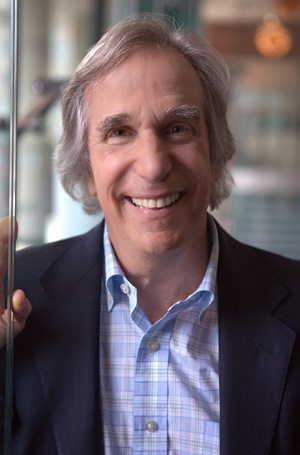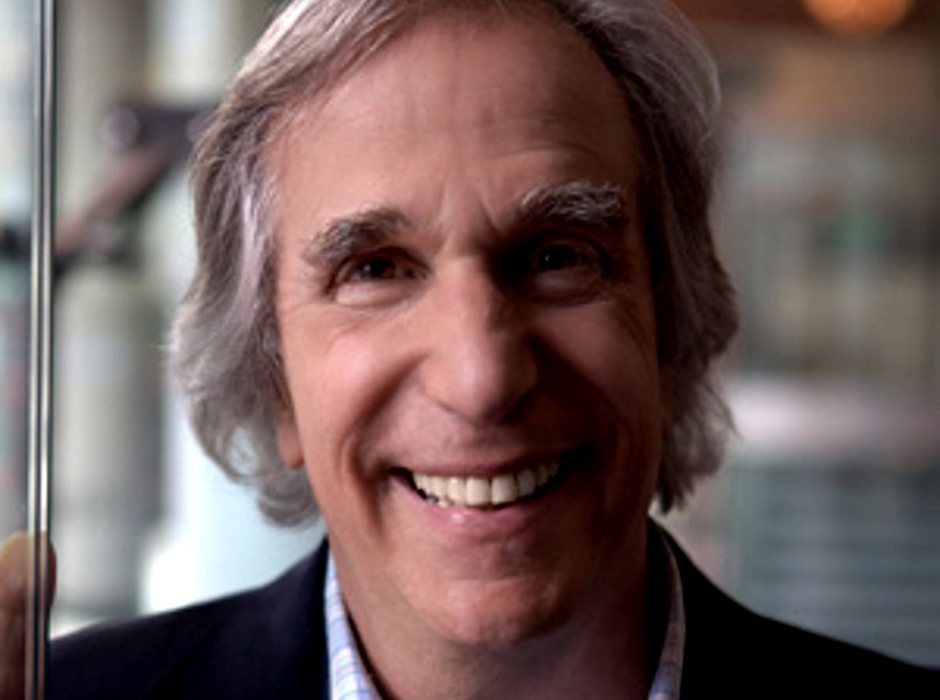[dropcap style=”font-size:100px; color:#992211;”]H[/dropcap]appy Days for the ‘Superhuman Greaser’ as he converts his kryptonite into gold.
Known to many around the globe as The Fonz from the US TV Sitcom Happy Days, Henry Winkler has struggled with dyslexia his whole life and was recently in London supporting the First News education campaign My Way.
‘I was 31 when I found out I had dyslexia. At the time, Jed my stepson was tested and everything they said to him turned out to be true about me.
One out of five people have some sort of learning difficulty. It is hereditary and the child has no say in the matter, the child does not wake up and say ‘hey I think I’ll be disruptive in school today, I think I’m going to do that’. The My Way campaign is about helping those kids. Every child has their way and it’s about figuring out how to help them.
“Winkler, when you finally get out of here you’re going to be okay”. I took that one sentence and kept it in my heart.
Right now teachers are asked to teach the same material to the smartest kid in the class and the child that has the most trouble, in the same amount of time. They go from September to July and it’s herculean to the point of being impossible. And the classes are overcrowded to boot.
It’s just a matter of priorities. It’s not even a matter of necessarily more funds. It’s just a matter of thinking “You know what, education is really important, so let’s look at how we deal with the child that learns differently”.
My Way is about tailoring learning to the needs of the child; one child has ADD, one child has dyslexia, one child has some other form of learning disability. Let’s work with that.’
 Throughout his career Winkler has been involved in charitable causes. From recording public service announcements on epilepsy, to hosting a cerebral palsy telethon for 15 years (which raised over US$60 million), to working with abused and neglected children as well as being a supporter of the special Olympics, for Winkler helping others achieve is of paramount importance. Outside of simply being a celebrity face endorsing general principles Winkler is forceful in talking about how this help can manifest.
Throughout his career Winkler has been involved in charitable causes. From recording public service announcements on epilepsy, to hosting a cerebral palsy telethon for 15 years (which raised over US$60 million), to working with abused and neglected children as well as being a supporter of the special Olympics, for Winkler helping others achieve is of paramount importance. Outside of simply being a celebrity face endorsing general principles Winkler is forceful in talking about how this help can manifest.
‘You know what I saw. Here in Great Britain there are classes where the child is looked at by the age of four. So, in preschool they jump on a behavioural problem, or whatever they see and start to work with it then. So you know ‘Early!’ Secondly, it’s as simple as a gelatine overlay of colour over white paper, so that the words stay in place as opposed to your eyes jumping all over the place, so an amber piece of plastic changes a child’s life.
In the community of the parents or grandparents, there are incredible mathematicians, historians, people who can read really well, people who can come in and work in the classroom as satellites. I mean, I’m telling you it’s not brain surgery, it’s just a matter of rallying the troops.’
We have work out how to help that child, how to dig that gift out and give it to the world
Winkler is in a strong position to talk about learning difficulties since he struggled through much of his life undiagnosed and unaided but when considering the education of his own children he found himself thinking in the same narrow ways that affected him growing up. A watershed moment occurred when he was berating his son for standing and playing loud music when studying. Everything that Winkler had been told about how to study flew in the face of what he saw his son doing.
‘I realised that I was saying all the things that were said to me; you can’t listen to the radio while you’re doing your homework, you have to sit down in a good chair, you have to have good light…
He never sat down in his chair, he put his knee on it and listened to the radio. So it occurred to me that maybe he was using the radio as a tool to funnel all other sound out for him to focus. I mean the grades were coming home; he just did it his way.’
Apparently, allowing children to study in their own way works, Max Winkler has recently directed his first film ‘Ceremony’ starring Uma Thurman and he is process of writing his next feature with Johnny Knoxville. However, it soon becomes clear that the role of children in society is of larger interest to him.
It is really important to train the mathematician, the doctor the lawyer. But what about the child that leaves class twice a week and does plastering? The kid is really proud of himself since the room didn’t exist before he plastered it in the morning. I’m not building my own house – I need him or her. Why isn’t that child as celebrated as the scientist? A society functions when everyone is functioning on all eight cylinders.
This just came to me. A year ago here in England I heard kids saying “you know I’ve flunked all of my A-levels but I could open a construction company. I could do that. I’m good at this” and that’s what it’s all about.’
When asked how celebrating the builder and the plumber equally to the doctor and the scientist relates to working with learning disabilities he was clear.
‘Because I know that that child, the child with learning disabilities, if he is not celebrated he will start to break down. In the class, he’s working as hard as he can but it’s not sinking in, he starts to fade into the background, he sits at the back of the class, he drops out of school. I think 75% of people in prison are dyslexic or have learning challenges. They’re there because they dropped out of class. Again you turn that around by point of view, just a point of view, not a matter of judging.
I didn’t think about being anybody, I didn’t think about doing anything. I just thought about how am I going to live my dream and I would eat through brick in order to get it.
I want to tell you something right now.
The Iliad.
I have never quoted the Iliad in my entire career. I am a director, a producer, an actor, I have written 19 books. I have actually never ever used geometry. Okay. There are some people it is great for. It just doesn’t matter. If you learn differently, if you have trouble learning you have a gift in you, you have a greatness in you that has got to be celebrated. We have work out how to help that child, how to dig that gift out and give it to the world so that they don’t just instantly destruct and either hurt themselves, hurt society, hurt their loved ones or just non-function.
The problem is that children don’t vote. That is one of the reasons for why we talk about children being the future but we do very little about it. How do you cut education? How do you cut teachers? How do you not pay teachers who do these herculean tasks, who do the most important work outside of the parent? How do you do that and just say that “you know what, we’re not going to give you the tools”?’
One gets the sense that he’s never really forgotten the childhood frustrations he felt and as a result has gone to great lengths to be a voice for children’s need and rights. Asking him why he thinks that children still don’t have a strong voice in western society Winkler believes that it has to do with the structure of government and the priorities of contemporary American politics.
‘Advocacy for children is probably the most important thing that is truly missing from 75% of the population.
(Children are voiceless in western democracy) …because, a child should be seen and not heard, because a child couldn’t possibly know, a child doesn’t have a say, a child doesn’t vote.
It used to be that the Quarterly Report was my least favourite phrase in the society’s language, it has completely destroyed the fabric of western culture. I now have a new word to replace it; ‘beholden’.
In America, the Supreme Court has allowed companies to give as much money as they possibly want to the candidate of their choice. And the candidate now is so ‘beholden’ that the population no longer matters. I don’t know what the fuck politicians do. I don’t know what their job is ‘cos we elect them to only take care of themselves. It is shocking to me that they are so blatant about it. I have no idea what the hell we’re doing.
Self-image is the beginning and the end of living.
(on campaigning) I think we can learn from England which is around six weeks long. There is about six weeks to make your (UK) decision and in ours (US) now there is about 17 months; of jockeying for position, of ripping each other apart. They are all beholden to the healthcare industry who don’t want to give to the people that need it most.’
In 2008, Winkler joined his old cast mate and director Ron Howard in campaigning for Barack Obama, I wondered whether Winkler still felt that Obama was a good president, and knowing what he knows now would he still have campaigned three years ago.
‘Yeah, and I will again.
Let me just say this. You think if you elect Michelle Bachman (Republican, Tea Party) or whoever the Republicans are, you think they are going to step in a figure it out. I don’t think they give a shit. I don’t think they give a shit except for the 1% of the population (which are the companies) that give them the money. So what are they going to say; ‘Oh Obama hasn’t really helped’?
Have you seen that movie ‘Too Big To Fail’ or ‘Inside Job’? We were this close (holds fingers together) to total financial collapse. You and me, England and America, we were this close to being Kaput.
Greed.
We have not done anything to any of those people.
No criminal proceedings (against them) but not even regulation. I’d rather have regulation rather than have someone like them do it again. Watching Inside Job you will be riveted, you will be so amazed that these few men could have screwed us into oblivion. I’m not kidding. It’s not even an intellectual exercise, this is a jaw dropping event, and it will make you so angry that smoke will come out of your ears.’
Winkler sees life as something that he has the power to change, he talks about the frustrations of not living up to his potential. Something that is echoed in his feelings on politics, he strongly believes that as a culture Western society is losing talented people through not understanding their needs. In part this is because the government isn’t reactive to the needs of the greater populace but also that individually people are being lost in the system. It is an obvious teleology that if people are empowered they are active politically and feel secure enough to take advantageous risks, push themselves to achieve, and ideally make the world a better place for others. These feeling start in childhood and with the quasi-autobiographical Hank Zipzer books that Winkler writes (19 bestselling children’s titles and counting… ) you can see how he aims to empower early readers to understand that life struggle can be approached with a smile.
‘The emotion is real, the story is comedy. I never dressed up as a table in an Italian restaurant, I never flooded a classroom, I never put chilli in an enchilada so that my teacher blasts across the room like she had a rocket under her skirt. But they make the children laugh and the kid happens to have dyslexia. It’s not like ‘oh this poor kids can’t read well’. They’re funny books. He (the hero Hank Zipzer) happens to have challenges. The kid works through challenges and he has great friends who are not dyslexic.
(…and there are deeper social messages in the books?)
For sure and children get them all. The kids say “oh how did you know me so well”, “Wow his friends don’t judge him at all” and “If he (Winkler) can be a writer, I can be a writer”. I’ve had letters back from kids saying just that ‘Hank is really smart, if he can be smart I can be smart too’.
I’m telling you! I’m living proof. But I tell you what I didn’t think about, I didn’t think about being anybody, I didn’t think about doing anything. I just thought about how am I going to live my dream and I would eat through brick in order to get it. I would do just whatever I had to do to find a way to get to the other side.’
I don’t know what the fuck politicians do. I don’t know what their job is ‘cos we elect them to only take care of themselves. It is shocking to me that they are so blatant about it.
In other interviews Winkler has remarked that he saw himself as the opposite of the Fonz, instead of the outgoing archetypal hero, Winkler himself was always shy about his success. While he doesn’t come across as a man who practises false humility there is a begrudging humbleness to him, scars one imagines from struggling through life to get where he is. I asked the man who once thanked a student audience for listening to him ‘because his parents never did’ whether he heard any words of support growing up.
‘No. Well Mr. Rock, who is in the book (Hank Zipzer), my music teacher, he said “Winkler, when you finally get out of here you’re going to be okay”. I took that one sentence and kept it in my heart.
Everybody else said that I would never achieve, they said I was lazy or stupid or whatever.
Self-image is the beginning and the end of living. So, knowing that you’re not keeping up is like a little insidious worm, it eats away at your self-image and you start to disintegrate. You start to shift away like you’re made of salt, the grains just hit the floor. It is our job then, as friends, as parents, as teachers to make sure that the child maintains their self-image at all times.’
Trying to imagine the young shy Winkler is difficult when in the presence of this viscerally alive Hollywood actor, producer, author, director and father. Winkler is obviously a man who has conquered many of his demons through an intense force of will. But rather than dismissing his past he views his particular battlefield as a place to revisit, learn, and make sure that it never happens again.
Through his Hank Zipzer novels Winkler must inevitably revisit areas of his biography but he transmutes the outlook and outcomes of those situations from tragedy to positive comedy. Whether this process was rewarding on its own is a matter of speculation but it is clear that Winkler feels deeply touched, perhaps even healed, by the responses he’s received from children around the world. Moreover, it’s not unreasonable to consider that he’s made a difference in their lives as though he were talking to his younger self.
As our interview drew to a close Winkler answered the question about what he’s learnt to help him cope with Dyslexia, with self-belief:
‘I learned that if I listen to my instinct I would always be in the right place. I would always be doing the right thing. My mind, as educated as I was, only knew some things, my instinct knows everything. So I am literally presumptuous enough to pass that on. Your instinct will always tell you what you should be doing.’
Sources:
Henry Winkler IMDB.
First News My Way Campaign Supported by Henry Winkler
First News My Way – home
Photos: By Carl Byron Batson

Editor, founder, fan.

















